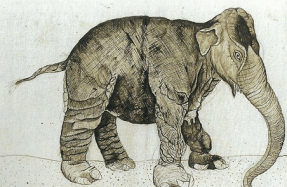DISTURBING THE DEAD: CENTURIES OF GRAVE CUTTING

The Augustinian Jedburgh Abbey dates to the 12th century and is located at the historic heart of Jedburgh, striking an imposing sight when approaching the town from the south. The abbey is one of four great abbeys located in the Scottish borders and was subject to damage and destruction between the 1520s and 1540s, when control of Jedburgh was fought over by English and Scottish armies. Its demise was complete by the time of the Reformation in 1560, but it remains a significant feature of Jedburgh, as a draw to tourists for centuries, with sketches and artistic impressions of the building dating back to the late 1700s.
A formalised, raised walkway, known as ‘the rampart’ is located to the east of the current abbey boundary, with some suggesting that this dates back to the 1500s and was constructed by French troops in support of the Scottish armies embroiled in battle with English troops. A boundary line potentially representing the rampart is indicated on an untitled plan of Jedburgh from 1775, separating the ‘High
You’re reading a preview, subscribe to read more.
Start your free 30 days





